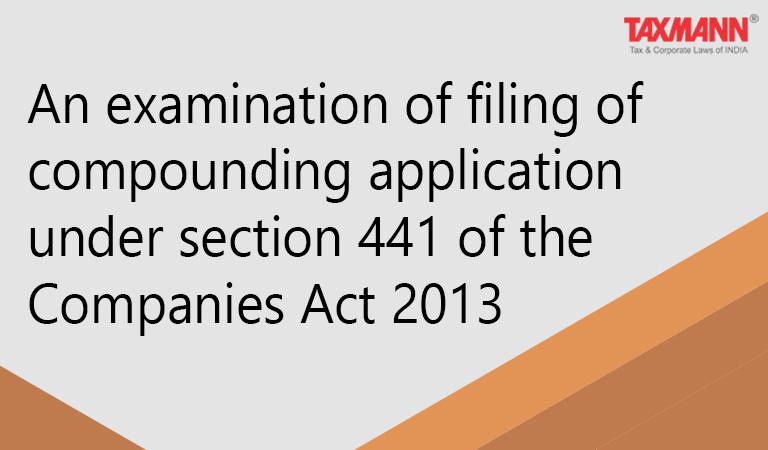An examination of filing of compounding application under section 441 of the Companies Act 2013
- Blog|News|Company Law|
- 3 Min Read
- By Taxmann
- |
- Last Updated on 25 September, 2021

[2021] 130 taxmann.com 363 (Article)
Introduction
1. Section 441 of the Companies Act 2013 as amended (the “Companies Act”) has the provision for filing applications for the offences to be compounded. This article is trying to examine specifically, the need and procedure for filing compounding applications under the provisions of section 441 of the Companies Act 2013 in respect of certain past offences/violations. The moot question that arises here is that when the offences are set right – on the proposed day of filing the compounding application, there is no existence of an offence – at this stage, whether the compounding application is still required to be filed or otherwise.
Let us take an example and analyze the issue
2. If we could take a factual example and analyze the requirements in relation to section 441 of the Companies Act 2013, the same would help us in understanding the mind of the regulators and also the spirit behind the law rather than the letter of law.
Certain requirements of section 203 and section 149 of the Companies Act 2013, relating to the appointment of Key Managerial Personnel (KMP) and appointment of women Director
2.1. The following are the provisions in respect of appointment of KMP /woman director and independent directors
(i) Appointment of Key Managerial Personnel: The Companies Act 2013 provides in its sub-section (1) of section 203 read with Rule 8 of Companies ( Appointments and Remuneration of Managerial Personnel) Rules 2014 as amended, all types of companies (public – listed or unlisted, private etc.) having a paid-up capital of Rupees ten crores or more are required to appoint the following Key Managerial Personnel.
(a) Managing Director / Chief Executive Officer/ Manager
(b) Chief Financial officer and
(c) Company secretary
(ii) Company secretary appointment in Bank: Also every bank whether listed or otherwise shall have to mandatorily appoint a company secretary in their board as per the directions issued by the Reserve Bank of India.
(iii) Appointment of woman director: As per the provisions of sub-section (1) of section 149 of the Companies Act 2013 read with rule 3 of the Companies (Appointment and qualifications of directors) Rules 2014, as amended, all public companies having a paid-up capital of Rupees one hundred cores or more are required to appoint a women director on its board as one of the directors of the board.
(iv) Appointment of independent director(s): As per the provisions of sub-section (4) of section 149 of the Companies Act 2013 read with rule 3 of the Companies (Appointment and qualifications of directors) Rules 2014, as amended, all public companies having a paid-up capital of Rupees one hundred cores or more are required to appoint two independent directors on its board.
These companies would have to reconstitute the Audit Committee and Nomination and Remuneration Committee etc. consisting of independent directors as per the provisions of the Companies Act, 2013.
Let us also consider the real-time situation on this issue with the following realistic assumptions
3. At the first place, let us assume that in the case of the private limited company, which was covered under the provisions of Rule 8 of Companies (Appointments and Remuneration of Managerial Personnel) Rules 2014 as amended was required to appoint key managerial personnel in the form of a whole-time company secretary. The company, due to some reason or other did not appoint a company secretary for a period of say 3 to 4 months and by the time, the year ending has happened i.e. as at 31 March. However, the company, subsequently, in the subsequent financial year
Click Here To Read The Full Article
Disclaimer: The content/information published on the website is only for general information of the user and shall not be construed as legal advice. While the Taxmann has exercised reasonable efforts to ensure the veracity of information/content published, Taxmann shall be under no liability in any manner whatsoever for incorrect information, if any.

Taxmann Publications has a dedicated in-house Research & Editorial Team. This team consists of a team of Chartered Accountants, Company Secretaries, and Lawyers. This team works under the guidance and supervision of editor-in-chief Mr Rakesh Bhargava.
The Research and Editorial Team is responsible for developing reliable and accurate content for the readers. The team follows the six-sigma approach to achieve the benchmark of zero error in its publications and research platforms. The team ensures that the following publication guidelines are thoroughly followed while developing the content:
- The statutory material is obtained only from the authorized and reliable sources
- All the latest developments in the judicial and legislative fields are covered
- Prepare the analytical write-ups on current, controversial, and important issues to help the readers to understand the concept and its implications
- Every content published by Taxmann is complete, accurate and lucid
- All evidence-based statements are supported with proper reference to Section, Circular No., Notification No. or citations
- The golden rules of grammar, style and consistency are thoroughly followed
- Font and size that’s easy to read and remain consistent across all imprint and digital publications are applied



 CA | CS | CMA
CA | CS | CMA
